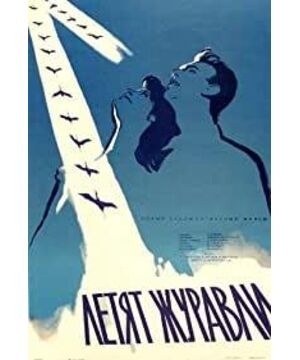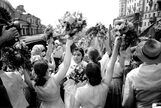I was impressed by two scenes in the movie, one is before the hero died, he saw the spinning sky and the one who was on the spiral staircase, running towards the girl he loved overlapped. Then he saw the two people in dresses, surrounded by the crowd, walking down the stairs, the bride's wedding dress, the veil flying, their faces filled with happy smiles, they kissed and hugged. Another scene is the finale. The heroine is wearing a white dress that looks like the one from the "wedding", holding flowers in her hands. She keeps walking through the crowd in front of the station. She struggles to find her lover. That scene, Like the day she sent him away. When she learned the news of her lover's death, she burst out of the crowd crying again. This was the first time she shed tears after experiencing the love of her life, including her parents, leaving one by one, and I followed her in tears. full face.
Several black-and-white films on Mr. Dai Jinhua's film list are all about war, and this is the first one with the theme of love in the war years. This is also the one that touched me the most in the whole list. I believe that when it comes out, it will be shocking and exciting to people who have experienced the trauma of war. It accuses the cruelty and meaninglessness of war, and at the end of that wonderful speech of Schipan, every word is eloquent and deafening. He said, "We will do everything in our power to make those fiancées no longer lose their fiancés; to make those mothers no longer worry about the lives of their children; to make the strong and competitive father no longer secretly cry in secret, we are victorious , we want to live, but not to destroy, but to build a new life."
View more about The Cranes Are Flying reviews






